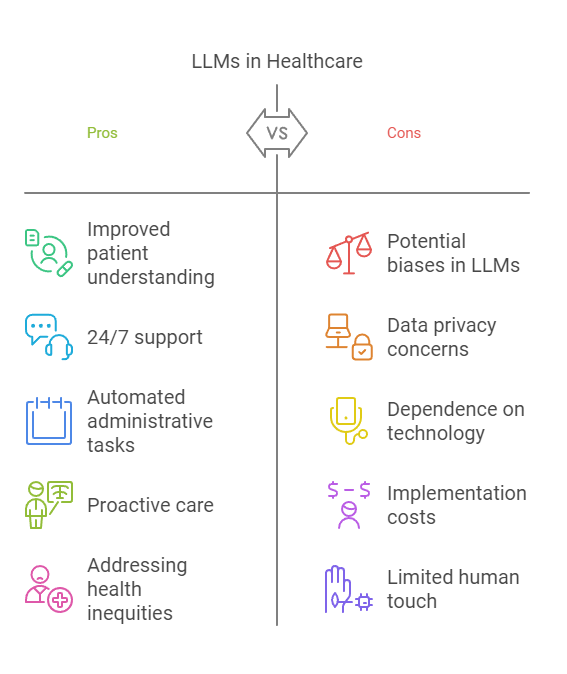Potential of LLMs to Improve Patient Experiences

LLMs offer exciting potential to revolutionise patient experiences, making healthcare more engaging, efficient, and individualised. Here are some key areas where LLMs can make a significant difference:
Improved Understanding and Education: Patients often struggle to comprehend complex medical jargon or navigate the intricacies of their health conditions. LLMs can bridge this gap by:
- Generating personalised explanations: LLMs can translate complex medical information into clear, easy-to-understand language tailored to individual patient preferences and learning styles. Imagine receiving a summary of your doctor's notes or test results explained in plain language, with visuals or videos to aid comprehension.
- Providing 24/7 support through chatbots and virtual assistants: LLMs can power AI companions that answer patient questions, offer guidance, and help them navigate the healthcare system at any time. This can alleviate anxiety, reduce confusion, and empower patients to take a more active role in managing their health.
Enhanced Care Coordination and Navigation: Dealing with appointments, insurance, and multiple providers can be frustrating and time-consuming for patients. LLMs can streamline these processes by:
- Automating administrative tasks: LLMs can schedule appointments, manage prescriptions, send reminders, and even assist with insurance claims, freeing up patients from administrative burdens.
- Facilitating communication: Imagine an LLM-powered app that consolidates all your medical records, tracks appointments, and even communicates with providers on your behalf, ensuring seamless care coordination.
More Personalised and Proactive Care: LLMs can help shift healthcare from a reactive to a proactive approach, focusing on prevention and early intervention:
- Identifying potential health risks: LLMs can analyse patient data to detect patterns and flag potential health risks, enabling early interventions and preventive care.
- Tailoring treatment plans: LLMs can consider individual patient characteristics, medical history, and preferences to help develop personalised treatment plans that are more likely to be effective and sustainable.
- Remote patient monitoring: LLMs can analyse data from wearable devices and other remote monitoring tools to identify concerning trends and alert healthcare providers, allowing for timely interventions and adjustments to care.
Addressing Health Inequities: LLMs have the potential to make healthcare more equitable by:
- Identifying and mitigating biases: LLMs can be trained to recognise and counteract biases in medical data and decision-making processes, promoting fairer and more equitable care for all patients, especially those from marginalised communities.
- Tailoring interventions to specific needs: LLMs can consider social determinants of health and cultural factors to develop tailored interventions and improve access to care for underserved populations.
Overall, LLMs hold immense potential to improve patient experiences by providing personalised support, streamlining processes, and empowering individuals to actively engage in their health journey. However, it is critical to address ethical considerations and ensure responsible development and deployment to fully realise these benefits.
